Top Rankings
Manheim Township School District ranks among the top 20% of public school district in Pennsylvania for:
Category
Attribute
Overall Rank
Highest overall rank (Top 20%)
Math Proficiency
Highest math proficiency (Top 20%)
Reading/Language Arts Proficiency
Highest reading/language arts proficiency (Top 20%)
Science Proficiency
Highest science proficiency (Top 20%)
Diversity
Most diverse schools (Top 1%)
Community Size
Largest student body (number of students) (Top 1%)
For the 2025 school year, there are 7 public elementary schools serving 3,135 students in Manheim Township School District. This district's average elementary testing ranking is 10/10, which is in the top 10% of public elementary schools in Pennsylvania.
Public Elementary Schools in Manheim Township School District have an average math proficiency score of 61% (versus the Pennsylvania public elementary school average of 35%), and reading proficiency score of 70% (versus the 54% statewide average).
Minority enrollment is 39% of the student body (majority Hispanic), which is less than the Pennsylvania public elementary school average of 42% (majority Hispanic and Black).
Overview
This School District
This State (PA)
# Schools
9 Schools
2,145 Schools
# Students
5,993 Students
1,108,977 Students
# Teachers
401 Teachers
82,943 Teachers
Student : Teacher Ratio
15:1
15:1
District Rank
Manheim Township School District, which is ranked within the top 20% of all 675 school districts in Pennsylvania (based off of combined math and reading proficiency testing data) for the 2021-2022 school year.
The school district's graduation rate of 93% has increased from 91% over five school years.
Overall District Rank
#71 out of 684 school districts
(Top 20%)
(Top 20%)
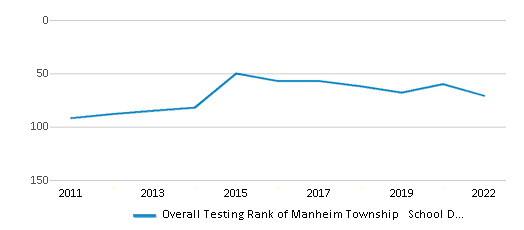
Math Test Scores (% Proficient)
54%
36%
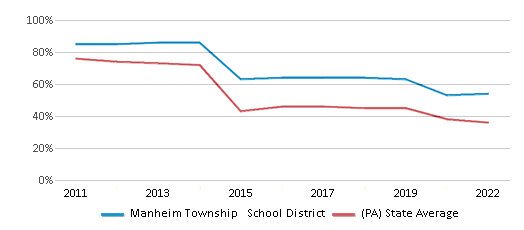
Reading/Language Arts Test Scores (% Proficient)
71%
55%
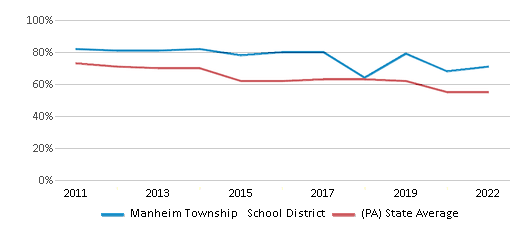
Science Test Scores (% Proficient)
73%
57%
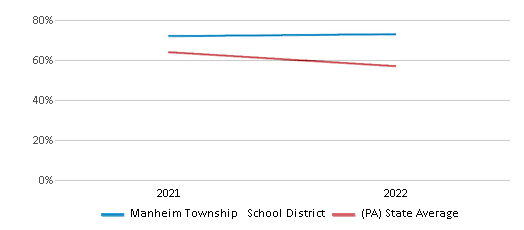
Graduation Rate
93%
87%
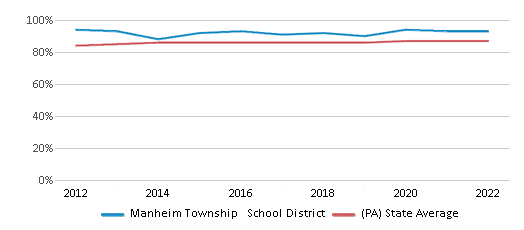
Students by Ethnicity:
Diversity Score
0.58
0.61
# American Indian Students
2 Students
2,278 Students
% American Indian Students
n/a
n/a
# Asian Students
581 Students
51,838 Students
% Asian Students
10%
5%
# Hispanic Students
959 Students
173,776 Students
% Hispanic Students
16%
16%
# Black Students
339 Students
169,696 Students
% Black Students
5%
15%
# White Students
3,705 Students
645,871 Students
% White Students
62%
58%
# Hawaiian Students
2 Students
965 Students
% Hawaiian Students
n/a
n/a
# Two or more races Students
405 Students
63,991 Students
% of Two or more races Students
7%
6%
Students by Grade:
# Students in PK Grade:
-
7,744
# Students in K Grade:
453
110,287
# Students in 1st Grade:
421
120,767
# Students in 2nd Grade:
456
126,133
# Students in 3rd Grade:
443
120,907
# Students in 4th Grade:
452
125,574
# Students in 5th Grade:
462
126,000
# Students in 6th Grade:
442
126,698
# Students in 7th Grade:
454
94,854
# Students in 8th Grade:
453
93,972
# Students in 9th Grade:
520
16,255
# Students in 10th Grade:
479
14,467
# Students in 11th Grade:
489
12,872
# Students in 12th Grade:
469
12,447
# Ungraded Students:
-
-
District Revenue and Spending
The revenue/student of $17,806 in this school district is less than the state median of $23,696. The school district revenue/student has stayed relatively flat over four school years.
The school district's spending/student of $19,639 is less than the state median of $23,119. The school district spending/student has stayed relatively flat over four school years.
Total Revenue
$107 MM
$39,541 MM
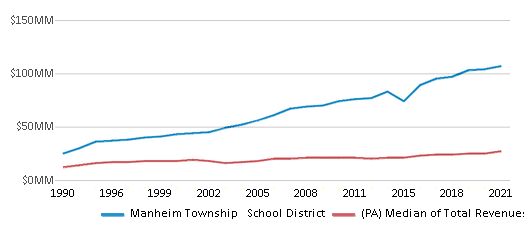
Spending
$118 MM
$38,578 MM
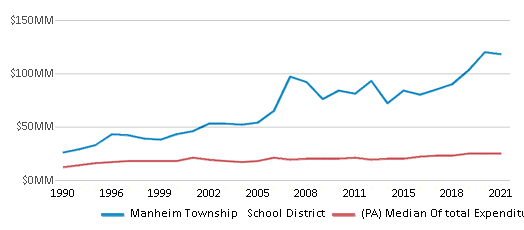
Revenue / Student
$17,806
$23,696
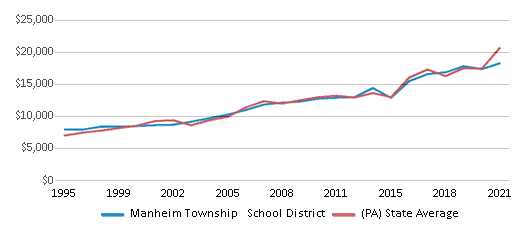
Spending / Student
$19,639
$23,119
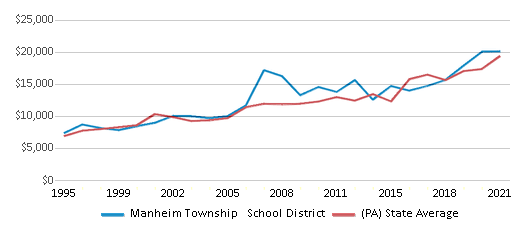
Best Manheim Township School District Public Elementary Schools (2025)
School
(Math and Reading Proficiency)
(Math and Reading Proficiency)
Location
Grades
Students
Rank: #11.
Neff School
(Math: 70-74% | Reading: 75-79%)
Rank:
Rank:
10/
Top 10%10
21 Valley Rd
Lancaster, PA 17606
(717) 569-8502
Lancaster, PA 17606
(717) 569-8502
Grades: K-4
| 274 students
Rank: #22.
Reidenbaugh Elementary School
(Math: 70-74% | Reading: 70-74%)
Rank:
Rank:
9/
Top 20%10
1001 Buckwalter Rd
Lititz, PA 17543
(717) 626-1000
Lititz, PA 17543
(717) 626-1000
Grades: K-4
| 495 students
Rank: #33.
Nitrauer School
(Math: 60-64% | Reading: 70-74%)
Rank:
Rank:
9/
Top 20%10
811 Ashbourne Ave
Lancaster, PA 17601
(717) 569-4239
Lancaster, PA 17601
(717) 569-4239
Grades: K-4
| 468 students
Rank: #44.
Schaeffer School
(Math: 60-64% | Reading: 65-69%)
Rank:
Rank:
8/
Top 30%10
875 Pleasure Rd
Lancaster, PA 17601
(717) 392-6797
Lancaster, PA 17601
(717) 392-6797
Grades: K-4
| 325 students
Rank: #55.
Landis Run Intermediate School
(Math: 55% | Reading: 70%)
Rank:
Rank:
8/
Top 30%10
25 Blue Streak Boulevard
Lancaster, PA 17606
(717) 581-9124
Lancaster, PA 17606
(717) 581-9124
Grades: 5-6
| 910 students
Rank: #66.
Bucher School
(Math: 65-69% | Reading: 60-64%)
Rank:
Rank:
8/
Top 30%10
450 Candlewyck Rd
Lancaster, PA 17601
(717) 569-4291
Lancaster, PA 17601
(717) 569-4291
Grades: K-4
| 420 students
Rank: #77.
Brecht School
(Math: 60-64% | Reading: 60-64%)
Rank:
Rank:
8/
Top 30%10
1250 Lititz Pike
Lancaster, PA 17601
(717) 291-1733
Lancaster, PA 17601
(717) 291-1733
Grades: K-4
| 243 students
Recent Articles

Year-Round Or Traditional Schedule?
Which is more appropriate for your child? A year-round attendance schedule or traditional schedule? We look at the pros and cons.

Why You Should Encourage Your Child to Join a Sports Team
Participating in team sports has a great many benefits for children, there is no doubt. In this article you will learn what those benefits are.

White Students are Now the Minority in U.S. Public Schools
Increasing birth rates among immigrant families from Asia and Central and South America, combined with lower birth rates among white families, means that for the first time in history, public school students in the United States are majority-minority. This shift in demographics poses difficulties for schools as they work to accommodate children of varying language abilities and socio-economic backgrounds.





